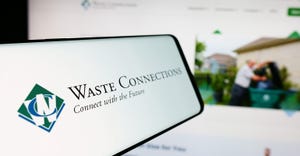UPS Will Power its Fleets by Getting Some Natural Gas from Landfills
Last month, UPS announced it will supply its fleet in Memphis, Tenn., and Jackson, Miss., with an estimated 15 million diesel gallon gas equivalents of renewable natural gas (RNG) as part of a multi-year agreement with Memphis Light, Gas and Water and Atmos Energy Marketing, LLC.
The deal is part of an initiative announced earlier this year by the Atlanta-based shipping company to significantly expand its use of renewable natural gas in UPS’ alternative fuel and advanced technology fleet. The company has a goal of driving one billion miles with its alternative fuels fleet, known as the Rolling Laboratory, by the end of 2017.
The renewed natural gas will fuel more than 140 heavy-duty trucks in Memphis and Jackson, part of UPS’s natural gas fleet, which includes more than 3,800 medium and heavy-duty vehicles worldwide. RNG, also known as biomethane, can be derived from many sources, including decomposing organic waste in landfills, wastewater treatment and agriculture. It is then distributed through the natural gas pipeline system, making it available for use as liquefied natural gas (LNG) or compressed natural gas (CNG).
The move is part of a broader trend among national shipping companies to switch their fleets to alternative and renewable fuels. And now—just after the holiday shipping rush—is a popular time for these companies to make the moves.
Rae Rushing, spokesperson for FedEx based in Memphis, Tenn., says the company predicts it moved a record-breaking 317 million shipments between Black Friday and Christmas Eve this holiday season.
“This forecast marks a 12.4 percent increase in year-over-year seasonal volume,” she says. “As online shopping and e-commerce continues to grow, so does the number of packages moving through our global network.”
UPS also saw a higher proportion of “business to consumer” shipments year-round, which typically are driven by online shopping.
“UPS expects to make a record number of deliveries to residential addresses during the holiday period, up to 60 percent of all package deliveries, versus an average of 45 percent on a full-year basis,” says Kristen Petrella, UPS sustainability PR manager.
Petrella says that UPS is always looking for the most efficient way to deliver packages, including the use of alternative fuels for its fleets.
“Our long-term sustainability strategy is focused on transforming transportation and delivery. We will do this by improving the processes that consume non-renewable resources within our operations and our entire supply chain,” she says. “UPS has one of the largest private alternative fuel and advanced technology fleets in the United States.”
UPS’s fleet includes more than 6,430 all-electric, hybrid electric, natural gas, renewable fuels, biomethane and light-weight fuel-saving composite body vehicles. In addition to natural gas, UPS also uses many other alternative fuels in its fleet, including propane, ethanol, renewable diesel and electricity. In 2014, 5.4 percent of total gas and diesel purchased was displaced by using these alternative fuels.
In 2014, FedEx had 1,048 owned and contracted alternative fuel vehicles in its global fleet, including electric, hybrid, natural gas and hydrogen vehicles.
“We search for efficiencies across FedEx aviation operations through our FedEx Fuel Sense programs. Thanks to 46 of these programs, as well as our aircraft modernization program, we saved more than 100 million gallons of jet fuel that would have otherwise been used and avoided more than 976,000 metric tons of CO2e in 2014,” says Rushing. “At FedEx, we’re proud to be a leader in developing, testing and adopting alternative fuel and energy technologies.”
Developing alternative, economically viable energy sources is part of UPS’s commitment to reduce its environmental impact.
“UPS’ investment in a large scale alternative energy fleet has enabled the company to avoid more than 34 million gallons of conventional fuels since 2000,” says Petrella. “ORION (On-Road Integrated Optimization and Navigation) is our industry-leading system that determines the most efficient delivery routes across the U.S. When fully deployed at the end of 2016, it will reduce miles driven by 100 million miles and CO2 emissions by 100,000 metric tons each year.”
Last year, UPS was one of the initial 13 companies (now totaling 81) to join President Obama in taking the American Business Act on Climate Pledge, committing to a 20 percent reduction in greenhouse gas emission intensity by 2020, and a cumulative 1 billion miles traveled by alternative fuel vehicles by the end of 2017.
“Our commitment to deploying alternative fuels and advanced technology vehicles encourages market adoption of cleaner fuels and technologies,” says Petrella.
About the Author
You May Also Like


